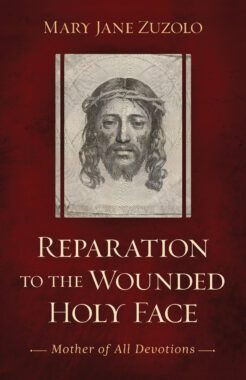The role Job played in the salvation of his friends may be interpreted as prefiguring both the Church and Christ. The friends, according to St. Gregory the Great, are “heretics,” while Job is a type of the Church, “whose faith they used to impugn with their false assumptions.” The heretics, therefore, must obtain their salvation by way of the Church’s prayers.
Interrelated, yet somehow more poignant than Job representing the Church while his friends represent heretics, is Job’s vicarious, redemptive, Christlike suffering, which seems to be indicated by Job’s face being more acceptable to God than that of his friends. Pope St. John Paul II, among others, saw the innocent suffering of Job in the Old Testament as prefiguring the Lord’s Passion. In this case, Job’s face being offered is analogous to Christ’s innocent suffering in atoning for the sins of man.
Considering the nineteenth-century revelations given by Christ requesting reparation to the Holy Face, there is a modern-day synthesis of these two notions of prefiguring in the book of Job—that of Job’s face being offered to God, symbolizing prayers of the Church for heretics, and that of Job’s face being offered to God, symbolizing Christ’s great act of Redemption. This synthesis is that Job’s face being offered to God in intercession for his friends may also prefigure man’s offering of the wounded Face of Christ to the Father in reparation for modern sins against the majesty of God to draw mercy for sinners, as called for in the Holy Face devotion.
In the revelations, the Face of Christ symbolizes not only Christ’s Redemption but also both the Godhead itself and the doctrine of the Church. The doctrine is the “Face of the Church,” which is wounded anew by the heretical words and actions of modern blasphemous and atheistic thought. The suffering Face of Christ is offered anew as an extension of the Most Holy Sacrament of the Altar,100 to atone for current affronts against the first three commandments. This act of reparation by man is an offering of Christ’s Face—His merits and love—which is infinitely more pleasing to God than is the face of man (just as Job’s face was more pleasing to God than that of his friends).
The offering of the wounded Face of Christ appeases the Father, and in His delight at the most beloved, suffering Face of the Son, He has pity on man’s face, disfigured by sin (just as God was moved to pity for Job’s friends out of love for Job).
Man is invited to repair the outrages committed against God, and by a return of love, God promises to repair his image in man’s soul [by] virtue of his adorable Face. . . . It seems that in . . . the virtue and power of his Holy Face, he has grand designs of mercy over the souls of mankind.
Just as Job’s face was offered to the Father in place of his friends to appease their affronts to the majesty of God, drawing down mercy for them, so now the Face of Christ is offered to the Godhead to appease modern affronts to the majesty of God to draw down mercy for the masses. Christ has given via the Holy Face devotion a modern model for man’s role in co-redemption. He has chosen to give man no less than an essential and necessary role to play in reclaiming the Church and times for Christ by aiding in the reorientation of man to God by repairing the affronts to His majesty, His sovereignty, His truth.
In addition to these parallels, the devotion is well explained by way of multiple analogies found within the book of Job: Satan wishing to tempt Job to blaspheme; Satan using Job’s wife to tempt Job to “curse God, and die”; Satan being allowed to tempt Job; Job’s leprosy; Job’s resistance and great humility; God’s acceptance of Job’s face in place of that of his friends; and Job’s reward of twice all his previous possessions for having interceded for his friends. All afford striking parallels to the essential fundamentals of the devotion, which make for a comprehensive outline in recounting the divine revelations given in the Holy Face devotion, echoing the lessons conveyed in the book of Job.
The first of these analogous similarities—namely, the hope of Satan that Job will be driven to blasphemy—represents a major parallel to the grave transgression of blasphemy as seen in the Holy Face devotion. Therein, it is the sin for which to make reparation in that it is the opposite of fear of the Lord. Why else, of all the horrific crimes that the devil could hope to induce Job to undertake, would he choose to tempt him to blaspheme? Satan knows what man “forgets”: that blasphemy is a sin against the dignity of God and that “this dreadful sin pierce[s] and wound[s] his Heart . . . more than all other crimes.” Our Lord said in the revelations to Sister St. Pierre, “You cannot comprehend the abomination of this sin. If my justice were not restrained by my mercy, the guilty would be destroyed in an instant; even inanimate beings would feel my vengeance, but I have an eternity in which to punish the wicked.”Most Christians today willfully disregard the magnitude of this sin, a dark triumph for Satan.
To understand the importance of reparation to the Holy Face, it is necessary to be convinced of this unparalleled offense of blasphemy and the way in which it extends to include all of the first three commandments. The second commandment forbids us to blaspheme by taking the name of Our Lord in vain, which is not only irreverent but ultimately idolatrous in that there is an implication in so doing that one has the power to “conjure” God at one’s bidding, “forming” the God of one’s desire. Our Lord made Sister St. Pierre understand that “the intelligence of man cannot conceive of the heinousness of the affronts offered God by the sin of blasphemy.” In addition, Sister St. Pierre understood through the revelations that the non-observance of the Lord’s Day is similarly an
outrage committed against the sovereignty of God, and an injury done to the sanctification of his Holy Name, a crime . . . identical with that of blasphemy: in fact, when the day is no longer sanctified by the suspension of labor [and the worship of God], the Holy Name of the Lord is not adored, blessed, known, or glorified as it should be.
Likewise, if one contradicts the first commandment—by upholding another as God, or in effect worshipping some object or aspiration as God, or by believing that there is no God—one is also blaspheming by taking from the name of God the praise and glory due to it. Logically, the first three commandments, which outline right behavior toward God, are intrinsically connected as blasphemy in all its forms, which is the antithesis of the proper fear and respect due Our Lord and His name.
Mgr. Morlot, observing nineteenth-century France, wrote about the then newly universal, commonplace, and contagious character of these sins, which lead to intemperance and increased immorality:
Have the workshops been closed? Has manual labor been suspended on the Lord’s Day? Show me the street or the thoroughfare of the city in which the noise of commerce has for one instant been interrupted! Everywhere the same clamor resounds, the same agitation, the same commotion sways the multitude as on weekdays. The children of men pursue their avocations with the same ardor as on the days assigned to labor. Here we behold them erecting stupendous edifices which the hand of God refuses to bless; there, exposing the produce of their industry, pursuing their speculations, their negotiations, their insatiable craving for wealth, for power, for honor. Look at our villages, pass on to our hamlets, what do we behold? The forgetfulness of God which necessarily follows in the train of profanation, and the countless other disorders, none the less deplorable. Yet the most diabolical of all these outrages committed against the majesty of God, is the shameful desecration of the Sundays and holy days: one part of the day is consecrated to business; the other, to pleasure; forbidden labor being always followed by disorderly pleasure. Servile occupation is succeeded by intemperance and immorality.
The magnitude of these iniquities is likewise and again clearly indicated in the revelations of Our Lord to Sister St. Pierre:
The earth is covered with crime! The sins against the first three commandments have provoked the wrath of my Father; the Holy Name of God blasphemed, and the profanation of the Lord’s Day fill to overflowing the measure of iniquity; this sin has mounted even to the throne of the Most High, and has aroused his wrath, which will burst forth over mankind in an impetuous torrent, if his justice be not appeased.
Satan is going to the heart of the matter by inducing man to contradict the first three commandments. Blasphemy, after all, is the hallmark of Satan’s own deadly sin: pride. Fittingly, according to the revelations, Satan willingly delegates other categories of sin, but he keeps those of blasphemy to himself.
Like all sin, blasphemy harms the sinner, for as Sister St. Pierre understood from Our Lord:
Blasphemy and the violation of the Lord’s Day are sins which attack God directly, in violation of the first three commandments; they confer no benefit on man but are sadly prejudicial alike to his temporal and spiritual happiness. They are diabolical in character: the unhappy transgressor labors not for himself but for the devil, who not only degrades, but enslaves his victim.
Mankind has tragic evidence of both the diabolical character of blasphemy and the enslavement of Satan in the most meticulously documented exorcism to date in the United States, which was the basis of the 1973 movie The Exorcist.
The exorcist priest and his assistant suffered unspeakable insults, blasphemies, filthy language, and physical violence from a possessed boy over a period of weeks. The devils left only when, instead of hearing guttural voices of demons coming from the boy, those surrounding the boy heard that of St. Michael, demanding that the evil spirits leave the body in the name of Dominus [the Lord]. The spirits had previously communicated that there was only one word that would drive them out and that the boy would never be allowed to say it.112 Here one is reminded of the Scripture passage, “Whosoever shall call upon the name of the Lord, shall be saved” (Acts 2:21).
This terrifying phenomenon indicates both the power of the name of God properly reverenced and the danger of its antithesis, blasphemy. (If blasphemy were not an emblem of godlessness, why would Satan use it?) Unaware though man chooses to be, sins of blasphemy are the mark of Satan’s enslavement, producing their deadly effect upon man. St. Alphonsus de Liguori, in fact, describes blasphemy as “the deadliest of all sins and as ordinarily unpardonable, for it is a crime of the highest magnitude that can be committed against the Divinity in that it attacks God openly and directly…. Blasphemy is the cause of maledictions on … earth.”
+
This article on Job, the Church, and Christ’s Vicarious Suffering is adapted from the book Unveiling the Sixth Station of the Cross by Mary Jane Zuzolo which is available from Sophia Institute Press.
Art for this post on a reflection from “Unveiling the Sixth Station of the Cross” by Mary Jane Zuzolo: cover used with permission; Photo by Anuja Tilj on Unsplash





